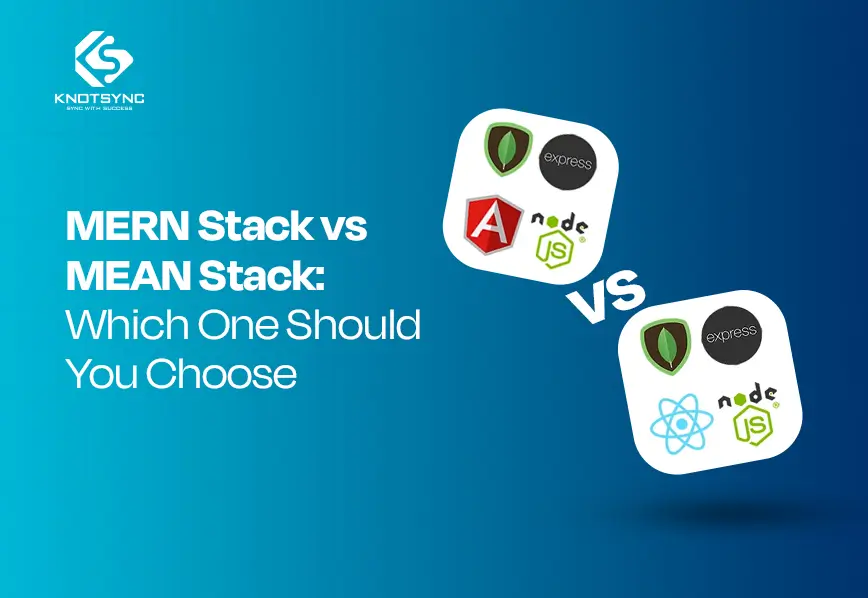The world of web development is filled with many choices, and selecting the right web development technology is important for the success of any project. The two popular choices that are most talked about is MERN stack and MEAN stack.
Each of these stacks provides a JavaScript-based ecosystem, which makes them a great option for developers who value efficiency and consistency.
But you must be wondering which stack is better for you.
Well to get your answer, read along the blog, where you can understand the basic meaning of these stacks, their pros and cons, and their key differences, which will help you choose a better stack for your next web development project.
What is MERN Stack?
MERN stack is a JavaScript-based stack that is used in web development. This is commonly used to build web or mobile applications. It is becoming popular with time, and many companies like Netflix, Uber and others use this stack. MERN stack technologies are a combination of four components that help developers provide end-to-end framework support. These components are:
- MongoDB: is a NoSQL document database that stores data in a flexible way. It stores and manages the application data.
- Express.js: Web application framework that helps build server-side logic and APIs. It provides an organized way to handle HTTP requests, routing, and middleware.
- React: is a JavaScript library that is used to create user interface (UIs). It handles the frontend and interact with the backend APIs.
- Node.js: is a JavaScript runtime environment for Express.js and allows JavaScript code to be run on the server side.
What is MEAN Stack?
MEAN stack is a full-stack JavaScript technology that helps build fast and robust websites and apps. It is a well-established technology and is used by many companies such as LinkedIn, PayPal, eBay, and more. This stack is known for its flexibility and scalability. The MEAN stack also consists of four technologies:
- MongoDB: same as MERN stack
- Express.js: same as MERN stack
- AngularJS: is an open-source JavaScript framework that is designed to build dynamic websites and web apps.
- Node.js: same as MERN stack
Pros and Cons of MERN Stack
MERN stack is a well-known open-source web technology which allows developers to work smoothly on both server and client sides. If you are thinking of using MERN stack for your web development needs, then you should be aware about the pros and cons of this technology.
Pros of MERN Stack
- Uses Only Single Language: MERN stack uses only one language which is JavaScript. It is the primary language that is used in all layers and there is no need to switch language in the frontend and the back end. This way, developers don’t need to learn multiple languages.
- Used For Full-Stack Development: MERN stack supports both frontend and backend application development within the single stack. This helps the developers to maintain the speed and consistency in their work.
- More Affordable Option: As we know, the MERN stack uses only JavaScript as its primary language, which makes it a more affordable solution. Rather than hiring different specialists for different technologies, you only have to hire JavaScript experts. This saves both money and time.
Cons of MERN Stack
- It is Not Ideal for Big Projects: With MERN stack, it can be quite difficult to do large project as it can face challenge in handling high loads. It is more often used to build single-page application.
- It Has Low Efficiency and Productivity: While React offers many benefits as one of the core components of the MERN stack, but ultimately it is just a library that uses third party libraries. This can impact on the productivity of the developers, and it requires extra efforts to optimize the code efficiency and maintainability.
Pros of MEAN Stack
- Comes with Everything You Need: MEAN stack uses AngularJS, which comes with a wide range of built-in tools. This means you don’t have to spend time adding extra things. It helps you build websites and apps faster and in a more organized way.
- Allows You to Reuse Codes: AngularJS lets developers build parts of an app in a way that they can be used again and again. It also works on different devices like phones, computers, and tablets. This means developers don’t have to build everything from scratch each time, so they can finish apps faster and do less extra work.
- Build Live & Interactive Apps: With Node.js, you can build real-time apps that update instantly without refreshing the page. For example, chat apps, live dashboards, or demos where users see updates right away.
Cons of MEAN Stack
- Lack of JavaScript Coding Guidelines: MEAN stack does not have a standard JavaScript coding guidelines. While this flexibility allows the developers to style the codes in their style, however, it can result in the inconsistent coding practices within the development team.
- It is Difficult to Master: AngularJS is a tool used to build websites, but it can be tricky for beginners. It uses something called TypeScript, which makes it harder to learn than some other tools like React.
Key Difference Between MERN Stack and MEAN Stack
Developers use these stacks to build great websites and apps. But you might be thinking about which stack is better for your project. So, let’s take a look at the table, which can help you understand the difference between the two stacks much better:
| Criteria | MERN Stack | MEAN Stack |
| Components | The components are MongoDB, Express.js, React, Node.js | The components are MongoDB, Express.js, AngularJS, Node.js |
| Frontend | Uses React for the frontend framework | Uses AngularJS for the frontend framework |
| Learning Curve | Easier for beginners | More complex for beginners |
| Popularity | Growing in popularity | Well-established |
| Performance | Faster UI rendering and real-tie interface | Structured framework and strong server-side performance |
Which One You Should Choose: MERN Stack Vs MEAN Stack
Choosing between the MERN stack and the MEAN stack can be a bit tricky since they both have similar components. The main difference lies in the frontend development framework.
MERN stack uses React which gives you flexibility, a faster learning curve, and making it ideal for building fast, interactive web apps. On the other hand, MEAN stack uses AngularJS, which is more structured and comes with built-in features, making it better suited for large, complex applications.
But if you’re working on a big project that needs solid structure and long-term maintainability, MEAN could be the way to go. Take some time to think about your project goals and your team’s strengths before choosing.
And if you’re still unsure, try building a small project with each to see which one feels right. It really comes down to project scope and team preference.
Frequently Asked Questions (FAQs)
In this section, we try to answer the most commonly asked questions that people have when choosing between the MERN and MEAN stacks. These answers will help you make a more informed decision based on your goals and project needs. Let’s review these questions:
1. Is MERN outdated?
No, MERN is not outdated. In fact, it continues to be a very popular stack in 2025, and it is a widely used set of technology for developing full-stack web applications.
2. Which full stack is best for freshers?
For freshers, the MERN stack is often considered easier to learn. React has a simpler learning curve compared to Angular, and MERN allows beginners to focus on JavaScript across both frontend and backend.
3. Is learning the MERN stack worth it in 2025?
Absolutely. Learning the MERN stack in 2025 is still highly valuable. Many companies continue to build products with MERN, and there’s strong community support and job market demand.
4. Which is more expensive, MEAN or MERN?
MERN may be slightly more cost-effective because it relies on JavaScript throughout, and React developers are more widely available. MEAN might require developers who are familiar with both Angular and TypeScript, which can sometimes be more specialized and cost a bit more.
Wrap Up
In the end, the best stack for your project depends on what you need and what matters most to you. By looking at the features, pros and cons of both the MERN and MEAN stacks and thinking about your team’s skills and your project requirements, you can choose which stack works best for you.
If you’re looking for a company offering expert web development services, consider reaching out to KnotSync. With a skilled team of developers, KnotSync delivers high-quality, scalable web solutions, whether it’s with the MERN stack or MEAN stack.




